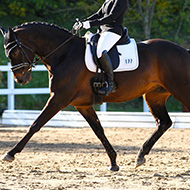Equine Ethics and Wellbeing Commission presents report

The surveys received responses from 116 countries.
The independent Equine Ethics and Wellbeing Commission (EEWB) has delivered its first report to the International Equestrian Federation (FEI) General Assembly.
Founded in June 2022, the EEWB aims to address equine welfare issues of public and equestrian concern, in order to improve horse welfare and secure the future of equine sport.
The Commission presented data from two surveys, one designed for horse enthusiasts and equestrians, and one for the general public. Responses were gathered from 116 countries, and almost 28,000 equestrians responded to the first survey.
In the general public survey, more than 14,000 responses were gathered from 14 countries. Following the responses gathered in both surveys, the EEWB Commission has made six initial recommendations to the FEI.
Key findings from the surveys showed that both equestrians (75 per cent) and the general public (65 per cent) have concerns about the welfare of horses in sport.
Of the participants, 67 per cent of the general public and 50 per cent of equestrians believe that horses sometimes or never enjoy being used in sport, while 78 per cent of the equestrian community and 53 per cent of the public believe that welfare standards need to improve.
Though there is concern for horses' welfare, 77 per cent of equestrians surveyed are optimistic for the future of horses in sport, provided welfare is improved.
Professor Dr Natalie Waran, EEWB Chair, addressed delegates: “As the Commission, we will be blunt. We will be direct and we will tell you the truth. But in the end we will be here with you.
“There is change that needs to happen and we are here to develop a strategy, provide objective advice, make recommendations and then see how these recommendations can be put into operation.
“I am pleased FEI members recognize that the data from the surveys is extremely valuable to identify concerns as well as suggested courses of action to mitigate them.
“While it’s clear that change is needed, I am confident that the FEI, the National Federations and equestrians around the world are committed to the journey.
“The work of the Commission will provide the structure, set the direction and help with navigating the actions that can be taken, but it will be the ongoing leadership of the FEI and work at local level that will help ensure that equine welfare is fully prioritized – and seen to be so – and so help equestrianism maintain its social licence.”
In the recommendations, the Commission addresses social licence based on six main pillars, evidence, education, engagement, effective regulation, enforcement and empowerment. From these, recommendations have been made on areas from tack and equipment issues to equine education.
When published, the full details of the methodology and findings will be available to view on the EEWB Commission's new website.



 FIVP has shared a survey, inviting those working in independent practice to share their views on the CMA's proposed remedies.
FIVP has shared a survey, inviting those working in independent practice to share their views on the CMA's proposed remedies.